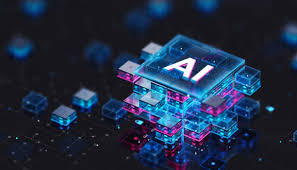The Impact of Artificial Intelligence on the Job Market: Opportunities and Challenges

Introduction
Artificial Intelligence (AI) is transforming industries at an unprecedented pace, reshaping the way we work, live, and interact. From automation in manufacturing to AI-powered chatbots in customer service, the job market is experiencing a significant shift. While AI brings numerous opportunities, it also presents challenges, particularly in employment and workforce adaptation. This article explores how AI is influencing jobs, the sectors most affected, and how individuals and businesses can prepare for this technological revolution.
1. How AI Is Changing the Job Market
AI is revolutionizing workplaces by automating repetitive tasks, enhancing efficiency, and enabling businesses to make data-driven decisions. This has led to both job creation and job displacement, depending on the industry and the role.
Key Ways AI Is Changing Work:
- Automation of Routine Tasks: AI-driven machines and software can handle repetitive and mundane tasks, reducing the need for human intervention.
- Enhanced Productivity: AI tools help employees work smarter by analyzing data, predicting trends, and optimizing workflows.
- New Job Roles: AI has created demand for data scientists, AI specialists, and machine learning engineers.
- Reskilling Requirements: Traditional jobs are evolving, requiring workers to develop new skills to remain relevant.
2. Industries Most Affected by AI
While AI is impacting almost every industry, some sectors are experiencing more significant transformations than others.
A. Manufacturing and Automation
AI-powered robotics and automation have replaced many manual labor jobs in factories, leading to increased efficiency but also job displacement.
Example:
- Car manufacturers use AI-driven robotic arms to assemble vehicles with precision and speed, reducing human error.
B. Customer Service and Retail
AI chatbots and virtual assistants are handling customer inquiries, reducing the need for human representatives.
Example:
- AI-powered chatbots like ChatGPT, Siri, and Alexa can provide instant customer support, answering queries and resolving complaints efficiently.
C. Healthcare
AI is revolutionizing healthcare through predictive diagnostics, robotic surgeries, and AI-driven drug discovery.
Example:
- AI-powered tools like IBM Watson help doctors analyze medical data and recommend personalized treatments.
D. Finance and Banking
AI automates fraud detection, credit scoring, and risk assessment, improving security and efficiency.
Example:
- AI-driven algorithms detect suspicious banking transactions and prevent fraudulent activities.
E. Education and E-Learning
AI-powered platforms personalize learning experiences, automate grading, and provide virtual tutoring.
Example:
- Platforms like Coursera and Duolingo use AI to offer personalized learning paths based on user performance.
3. Job Opportunities Created by AI
Despite concerns about job losses, AI is also creating new opportunities. The rise of AI requires skilled professionals to develop, manage, and maintain AI systems.
High-Demand AI-Related Jobs:
- AI Engineers: Develop and train AI models to solve complex problems.
- Data Scientists: Analyze vast amounts of data to uncover patterns and insights.
- Machine Learning Specialists: Build AI algorithms that improve over time.
- AI Ethics Consultants: Ensure AI systems are fair, transparent, and unbiased.
- Cybersecurity Experts: Protect AI systems from hacking and data breaches.
4. Challenges of AI in the Workforce
While AI presents many opportunities, it also brings several challenges that need to be addressed.
A. Job Displacement
Automation is replacing jobs in industries like manufacturing, customer service, and data entry, leading to unemployment concerns.
B. Skill Gaps and Workforce Readiness
Many workers lack the necessary technical skills to transition into AI-driven roles. Upskilling and reskilling are essential to stay relevant.
C. Ethical and Bias Issues
AI systems can sometimes be biased, leading to unfair hiring practices and discrimination. Ensuring ethical AI use is crucial.
D. Security and Privacy Concerns
AI-driven technologies collect vast amounts of personal data, raising concerns about privacy and cybersecurity.
5. How to Adapt to AI in the Workplace
To stay competitive in an AI-driven job market, workers and businesses must adapt by developing new skills and embracing change.
A. Upskilling and Reskilling
Learning AI-related skills can help individuals secure jobs in the evolving market. Online courses, workshops, and certifications are valuable resources.
Key AI Skills to Learn:
- Programming (Python, R, Java)
- Data Analysis and Machine Learning
- Cloud Computing and AI Deployment
- Cybersecurity and Ethical AI Practices
B. Embracing Lifelong Learning
Continuous learning and adaptability are essential. Professionals should stay updated on AI advancements and industry trends.
C. Developing Soft Skills
While AI can handle technical tasks, human skills like creativity, emotional intelligence, and critical thinking remain irreplaceable.
D. Businesses Investing in Workforce Training
Companies should provide AI training programs to help employees transition into new roles instead of replacing them.
6. The Future of AI in the Job Market
As AI continues to evolve, it will reshape the job market in ways we cannot yet fully predict. However, rather than eliminating jobs entirely, AI is more likely to transform them.
Predictions for AI and Jobs in the Next Decade:
- More hybrid jobs combining AI automation with human expertise.
- Increased demand for AI ethics and compliance professionals.
- Greater emphasis on human creativity and problem-solving in the workplace.
- Governments and businesses implementing AI-driven workforce policies and retraining programs.
Conclusion
AI is undeniably changing the job market, creating both opportunities and challenges. While automation may replace certain jobs, it also paves the way for new career paths and industries. The key to thriving in an AI-driven world is adaptability—embracing continuous learning, upskilling, and developing human-centric skills that AI cannot replicate.
As we move forward, businesses, governments, and individuals must work together to ensure that AI serves as a tool for progress rather than a force of disruption. By preparing today, we can create a future where AI enhances productivity, innovation, and employment opportunities for all.
Note: IndiBlogHub features both user-submitted and editorial content. We do not verify third-party contributions. Read our Disclaimer and Privacy Policyfor details.







